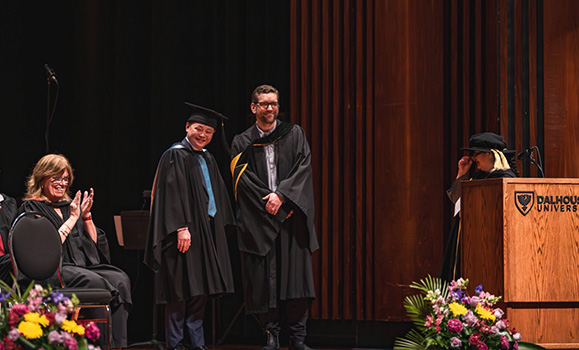Each year, Dalhousie’s Faculty of Graduate Studies selects two outstanding master’s graduates to receive the Governor General’s Gold Medal Award based on their dedication to academic excellence.
We caught up with this year’s recipients to learn more about their work and what they hope to achieve with it.
Junzhe (Young) Wang, Master of Applied Science in Biomedical Engineering
 Junzhe (Young) Wang, standing at left, during his Convocation ceremony earlier this year.
Junzhe (Young) Wang, standing at left, during his Convocation ceremony earlier this year.
While studying at pilipili¬˛ª≠, you could often find Young working with a team of researchers, led by Dr. Robert Adamson, exploring new imaging techniques for the middle ear. Their research will allow physicians to help assess a difficult-to-access area, enabling a precise diagnosis.
“Scientific breakthroughs are rarely solitary endeavors; they flourish in the fertile ground of collaboration and diverse perspectives,” states Young.
Real-world impact is what drives Young’s research, and his degree in Biomedical Engineering allows him to do it. The discipline bridges the gap between engineering innovation and healthcare, allowing for collaboration across fields. His ultimate goal: providing tangible value and progress for researchers, clinicians, and most importantly, patients, through his work.
Beyond working with a team of world-class researchers, Young‚Äôs overarching highlight of his time at pilipili¬˛ª≠ has been the combination of research freedom and a collaborative, supportive university environment.
“This unique combination enabled us and the teams to advance science and, most importantly, translate that research into real-world improvements in patient care. Witnessing the impact of our work on patients' lives was undeniably the most rewarding aspect of my master's studies.”
Throughout Young’s academic journey, particularly during his master's program, he had the privilege of contributing to projects that pushed the boundaries of diagnostic tools in clinical otology. This experience solidified his belief that incremental innovation, driven by a collaborative spirit, is key to transforming concepts into real-world solutions that improve patient care.
Young is now collaborating with a new team identifying unmet clinical needs and developing innovative solutions in the field of eye care. This is helping Young in his goal to start a MedTech company—with Drs. Gary Yau and  Nasef Ahmed—to develop and deliver transformative innovations that redefine the standard of care in ophthalmology.
Sydney Kanigan, Master of Social Anthropology

The intricacies of beginning- and end-of-life issues have always interested Sydney.
Sydney’s research lies at the intersection of mental health, medical assistance in dying and its legal implications. She was interested in diving into this contentious area through mediums that would be accessible to the public — such as news and social media —at a time when legislation was hotly debated.
“My thesis examines the arguments deployed by experts in the debate about medical assistance in dying where a mental illness is the sole underlying condition (MAiD MI-SUMC) across news articles, commentaries, and position statements,” states Sydney.
Across her dataset, Sydney found that the types of discourse emerging from the expert debate on MAiD MI-SUMC could be categorized into two overarching frames — promoting human rights or as an ableist policy — that ultimately reflect broader tensions around mental illness and mental health care in Canada.
Sydney is hopeful her research brings attention to some of the values and assumptions that underlie these arguments and the larger cultural notions of mental illness.
The process of working to design her research with her cohort and her supervisor, Fiona Martin, was a highlight during her time at pilipili¬˛ª≠, combined with working as both a teaching assistant and graduate student mentor.
Sydney is pursuing a law degree (JD) at the University of Victoria as she explores the legal aspects of MAiD and its underlying constitutional issues more broadly.  
